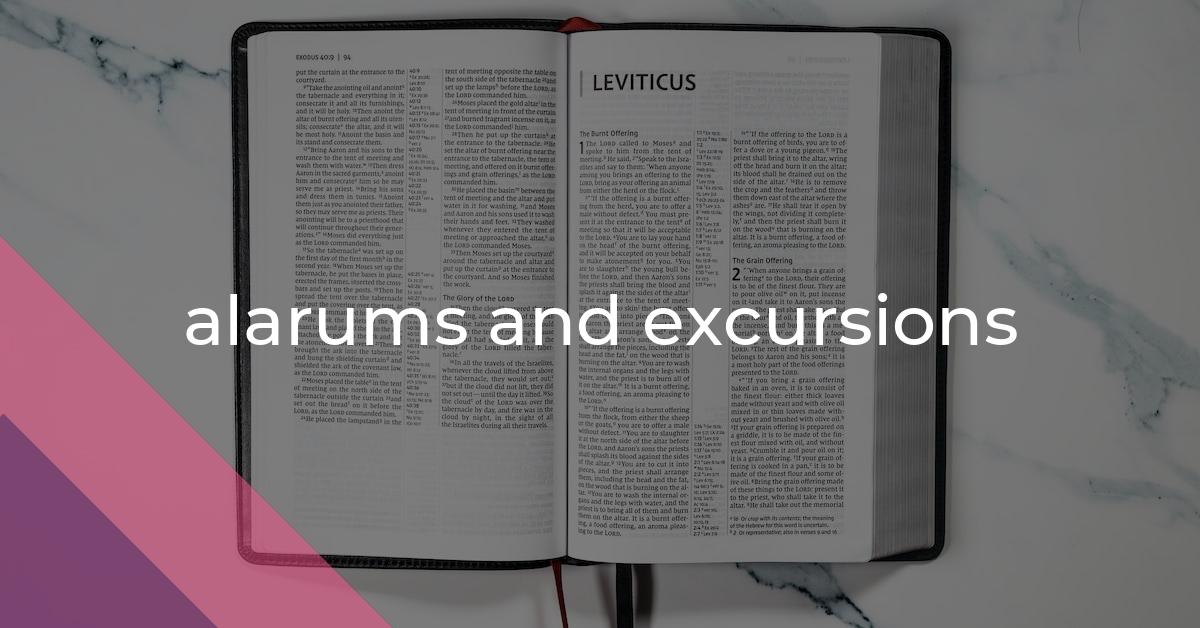alarums and excursions: Idiom Meaning and Origin
What does ‘alarums and excursions’ mean?
The idiom "alarums and excursions" refers to a state of chaos, confusion, or commotion. It is often used to describe a situation filled with noise, activity, or disturbance. The idiom originates from the language of stage directions in plays, where "alarums" represent the sound of trumpets signaling a battle and "excursions" refer to the movement or action on stage.

Idiom Explorer
An idiom referring to a situation or event that appears to be chaotic, disorganized, or confusing.
The idiom "kick bollocks scramble" refers to a chaotic and disorganized situation caused by a sudden disturbance or act of aggression. The imagery of the idiom emphasizes the disruptive and disorderly nature of the event.
An idiom used to describe someone who is in an emotional or mental state of extreme agitation, distress, or confusion.
The idiom "hustle and bustle" refers to a busy and noisy environment filled with various activities and movement.
The idiom "horror show" is commonly used to describe a situation or event that is extremely unpleasant, horrifying, or disturbing.
The idiom "go wild" means to become extremely excited or enthusiastic, often losing control of one's behavior or actions.
The idiom "go off" means to explode, to suddenly start making a loud noise, or to become spoiled or rotten. It can also mean to happen or take place, especially in a surprising or unexpected way.
The Origins Unveiled
Alarums and excursions is an idiom that originated in the Middle Ages, specifically in theatrical and military contexts. The word "alarum" is an old-fashioned spelling of "alarm" used to refer to a call to arms or a warning signal. "Excursions," on the other hand, originally meant military expeditions or campaigns. Over time, the idiom has evolved to describe chaotic or disorderly situations.
This idiom is likely derived from the sounds and activities associated with a military expedition or a theatrical performance. The word "alarum" was used to describe the loud, clamorous noises that accompanied the raising of a military alarm. Similarly, in theater, "alarum" referred to the staged noises that simulated battle or commotion. The word "excursions" in this idiom might have been borrowed from military terminology to emphasize the idea of a tumultuous event or an expedition, both of which involve movement and action.
Throughout history, the idiom has been used figuratively in various forms of literature to describe tumult, uproar, or a cacophony of noise and activity. It is often employed to convey a sense of disorder or confusion in a given situation. The idiom can be found in literature, journalism, and even in everyday conversations, where it functions as a metaphorical expression.
For example, an article in The New York Times from 1901 uses the idiom to describe a chaotic scene during a political fight: "The alarums and excursions of politics at the state capitol continue, and a large portion of the legislature seems to be intent upon conducting affairs in a high-keyed, sensational manner."
Moreover, the idiom is used in literary works to evoke a sense of chaos and disarray. In William Shakespeare's play "Macbeth," the character Macbeth uses this idiom to describe a tumultuous battle: "But all's too weak; / For brave Macbeth (well he deserves that name) / Disdaining Fortune, with his brandished steel, / Which smoked with bloody execution, / Like valor's minion, carved out his passage, / Till he faced the slave; / Which ne'er shook hands, nor bade farewell to him, / Till he unseamed him from the nave to th'chops, / And fixed his head upon our battlements." This passage highlights the violent and chaotic nature of the conflict.
In addition to its literal meaning, the idiom "alarums and excursions" has also inspired related idioms that capture similar ideas. One such idiom is "Mexican breakfast," which is used to describe a chaotic or noisy situation. This idiom may have originated as a humorous play on the sounds associated with both the word "Mexican" and the word "alarums" in the original idiom. Just like "alarums and excursions," "Mexican breakfast" suggests a scene filled with activity and commotion.
Another related idiom is "hustle and bustle." This phrase is commonly used to describe a busy, frenetic environment or a situation filled with activity and movement. The word "hustle" refers to energetic and purposeful activity, while "bustle" suggests a state of commotion and busyness. Similar to "alarums and excursions," "hustle and bustle" evokes a sense of chaos and disorder.
The idiom "alarums and excursions" originated in medieval times and has its roots in both military and theatrical contexts. It has been used figuratively in literature and everyday language to describe chaotic or disorderly situations. The related idioms "Mexican breakfast" and "hustle and bustle" further emphasize the sense of commotion and activity conveyed by the original idiom. Together, these idioms capture the energy and disorder of tumultuous events, adding color and expressiveness to our language.
Example usage
Examples of how the idiom "alarums and excursions" can be used in a sentence:
- During the performance, there were constant alarums and excursions as actors forgot their lines and props fell over.
- When the fire alarm went off, there were alarums and excursions as people hurriedly evacuated the building.
- The company's annual meeting turned into alarums and excursions as shareholders argued passionately about the proposed merger.
More "Theatrical" idioms



